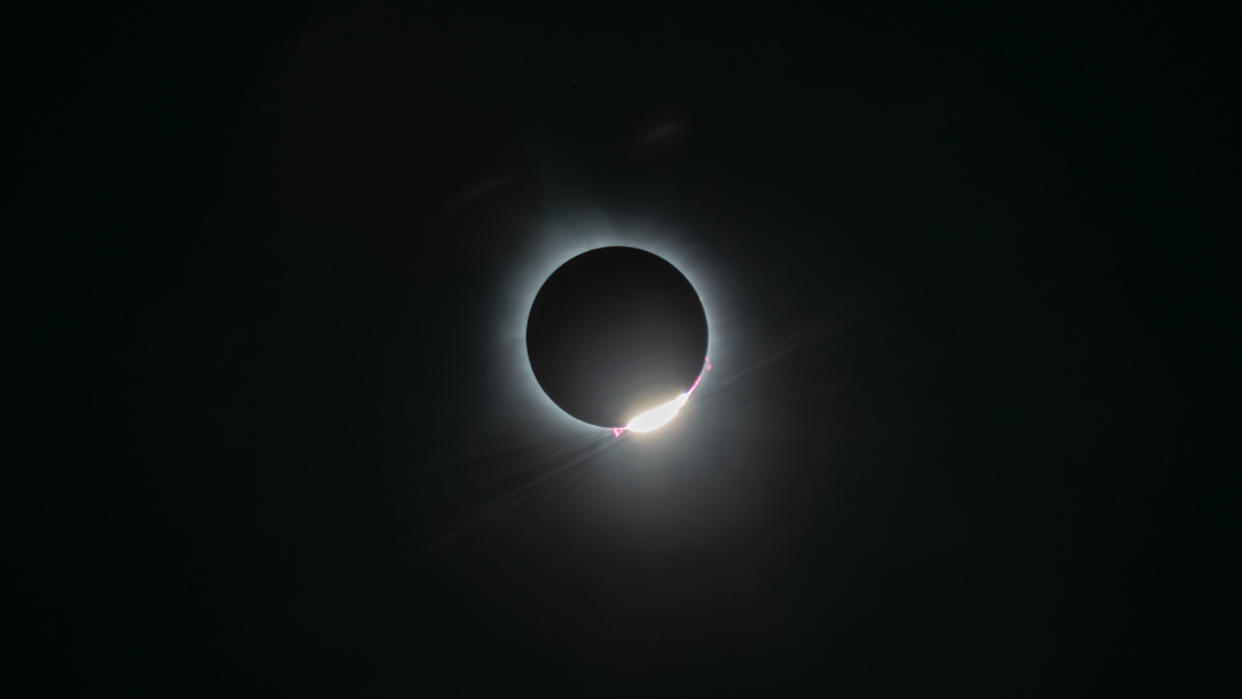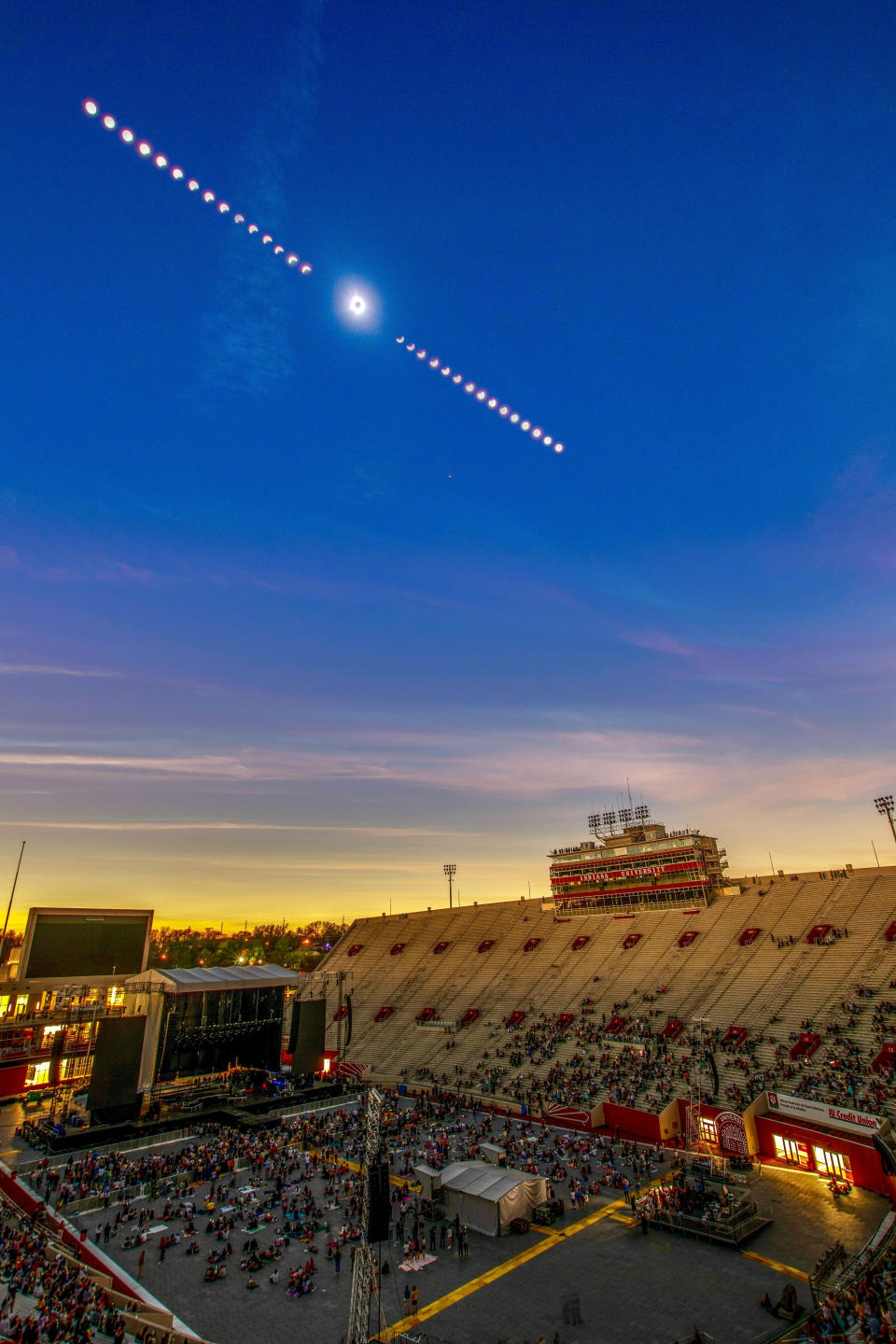My formal 2024 solar eclipse apology

Since April 8, when I witnessed a total eclipse of the sun, I've been feeling progressively more melancholy. It isn't because I was underwhelmed, or because my vantage point wasn't ideal, or because of some depressing epiphany I had while watching the moon turn our planet's star into a wispy white halo. I've actually been struggling to find the right words to explain my sullenness all week.
I've been scribbling random thoughts in my iPhone notes app as they've emerged. They've come up as I sat in a Lyft, ate pretzel bites at the airport and slumped in my aisle seat while listening to "Weird Fishes" on the flight home from Indianapolis to New York. I think these ideas, though not all related, share a certain yearning. What I realized is, the 2024 solar eclipse felt so intrinsically dream-like, confusing and surreal that, the more time passes from those few minutes of totality, the more my body accepts it as truly a dream. And it feels sad to distance myself so quickly. We usually get to have at least a few months, maybe even a few years, before yesterday becomes cemented in the past. I'm not quite sure I had a few hours.
The eclipse has already started to feel like a childhood memory that may have been concocted after watching old home videos — a memory attached to one vivid visual, maybe two, and a deep cradle of emotions. The image of totality is burned in my brain, but my mind was scattered during those moments because I was panicked about where to focus my eyes and what to think about that's important enough to be in the same room as an event most call "once-in-a-lifetime." I was overthinking it. One of my grammatically incorrect notes app scribbles literally says, "i didn't know where to look what to do with myself." The result is that I have only jumbled thoughts swiftly merging into a single echo, as I'm sure this story makes clear.
Related: I'm headed to Indiana to prove myself wrong about solar eclipses
On April 8, soon after it was announced the eclipse had begun, I didn't rush out of the Indianapolis Motor Speedway press room where I was sitting to catch a glimpse of the sun. There was no haste; I have even previously written about how I mostly classify myself as an eclipse cynic. I knew it'd be cool, even existential, but I wasn't sure I'd need to watch a bit of space traffic to be emotionally moved. I'm the type of person who can be emotionally moved by anything philosophical, so why would I need to physically see an eclipse? I already cared about the concept.
When I put on my cerulean paper Warby Parker solar eclipse glasses and peered up at the sun, I have to be honest: I thought I was going to be right about my skepticism. The sun looked very interesting. There's no doubt about that. I even texted our Space.com group chat saying I might wish the sun always looked like this, like a "bitten cookie" as my father described in a parallel text thread I had with him and my mother. It did. It resembled an orange ginger snap with a chunk knocked off in the shape of someone's dentition. Still, I wouldn't say I felt a profound shift. But as the clock continued ticking and totality began to approach, I grew aware of my breathing. It was alarming. I did not expect it.
Surrounded by thousands of people on a racetrack who were involuntarily shouting with glee as a crescent sun slipped into a sliver, I could sense the Earth turning. I could notice that we weren't standing on top of our planet, but rather were stuck to it somewhere on the side due to the curvature of space and time, and Earth itself. The crisp winds flowing through my hair started feeling like streams of individual molecules. The temperature dropping made me think about thermodynamics. I wondered where the birds were. A guy standing next to me, who had just asked me for advice about his solar eclipse glasses in a serious tone, was screaming "bro, look at the sky." I almost cried, and I didn't know if it was because of the eclipse or if it was because of myself.
Suddenly, I couldn't see anything through my lenses anymore. The sun was gone. Someone nearby yelled "take them off!" to no one in particular. I did, and I saw totality.

I've concluded that, as my pictures do not do totality justice, neither do my words. It would be like trying to explain what a new color looks like, or attempting to equate a photo of a sunset to a magenta-streaked sky, and that's why I have to end this story here. I needed to see this in person because it's something that language can't quite capture; there was something out there that seemed like it should not exist. Imagine seeing the moon for the first time after decades of living under an empty night sky. It is very visceral to see such a strange cosmic scene with only your eyes, as though you've traveled to an alien planet with a cold, black sun. They were right, whoever they are.
Another one of my notes app thoughts is a lyric from the song "Holy Shit" by Father John Misty. I'm not surprised I wrote this down. It's one of my favorite lyrics ever, and I think it can be interpreted in many different ways.
"maybe love is just an economy based on resource scarcity"

Related: I proposed to my fiancée under the diamond ring of the 2024 total solar eclipse
In this case, it made me think about how the rarity of a total solar eclipse, a rarity that owes itself in part to the sheer coincidence of our sun and moon appearing the same size from our perspective on Earth, is why my memory of this experience is so treasured, and one I wish wouldn't fade away. It's why it had the power to make me give the sun space in my mind next to the spot I've always reserved for the moon.
It would probably be better if we had more love in the world; I don't believe love needs to be an economy based on resource scarcity, and have always taken that lyric as a sarcastic point about how we've come to view love. But, maybe it's best we don't have more total solar eclipses. My cynicism might've actually held true if the solar eclipse market was saturated. Yet, total solar eclipses will remain rare. Therefore, so will the way they make us feel.
Maybe it was never purely about the sun, or the moon, and that's where my mistake was in thinking these events aren't really worth the hype; maybe it was just about resource scarcity, and a human desire to see the abnormal in such a way that we become aware of our existence. I don't think that's a bad thing, to be clear. It's simply perhaps why a total solar eclipse is considered so remarkable. Indeed, the one I saw was remarkable. So, if you would, please accept this article as my formal apology for being an eclipse hater.
